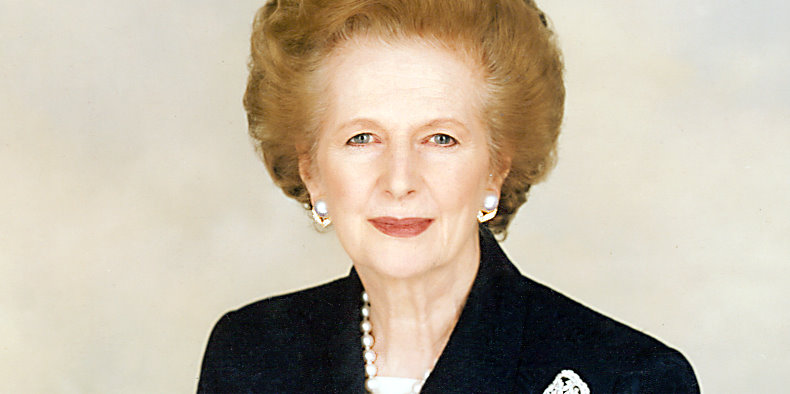
April 29, 2013, by ICCSR
Margaret Thatcher, CSR and me…
Margaret Thatcher’s death prompted many appraisals of her impact on politics and on people’s lives. I offer my, seemingly unlikely, tale of her impact on CSR and me.
Thatcher’s government introduced me to corporate social responsibility (CSR). Whilst researching public policy responses to mass unemployment, we were, first, perplexed, and then intrigued, by the business involvement in responses to the problem. These included: delivering government work-experience and youth training schemes; membership of, and secondments to, local employment partnerships; and the creation of enterprise incubators to support former employees develop their own businesses.
But what is the Thatcher connection? I distinguish the perverse and the paradoxical.
The Thatcher connection could be described as perverse given her association with the conditions which encouraged CSR: the rapid decline of mining and manufacturing and concomitant rises in unemployment. Although these reflect long-term structural factors, Thatcher’s ideological embrace of change – ‘there is no alternative’ – led believers and critics to attribute them to her purpose. It also created a sense of urgency for action on the part of business both to protect their own legitimacy and to invest in social and political conditions for economic recovery.
So I discovered CSR and learned that it is not just a feature of the ‘good times’ but can be about the business response to ‘hard times’. I witnessed this again in the early 1990s in Australia. Again this entailed government help, this time under the leadership of Australian Labor Party Prime Minister, Paul Keating.
Thatcher’s government went to considerable lengths to encourage CSR. It worked with business leaders to create the CSR association, Business in the Community. Minister Michael Heseltine led business leader tours of deprived and riot-damaged parts of UK cities. Subsidies were awarded to organisations which encouraged CSR. I am told that Thatcher herself phoned business leaders urging them to get involved.
This is paradoxical, firstly, because Thatcher identified with economist Milton Friedman, who famously criticised CSR for being unaccountable (in corporate governance and political terms) and undermining of markets.
Secondly, this was paradoxical because orthodoxy assumed CSR to be, definitionally, a business discretionary activity quite apart from the influence of law or government. Now governments of left and right, in such diverse places as Australia, India, Sweden and China, make policies for CSR.
So, thanks to Thatcher I began my three decade research interest in CSR, and particularly in CSR and government! I have found the topic intellectually and practically stimulating and it has shaped my career. I will leave it for others to judge on whether it was all worth it!
By Professor Jeremy Moon, Director of the ICCSR, Nottingham University Business School .
P.S. Thatcher also featured prominently in other of my research about the impact of leaders and parties on public policies, as against the logics of institutional structures and inheritance in explaining what governments do. A short version of my book appears as ‘Margaret Thatcher as an Innovative Leader’ Governance 8: 1-25 1995.
Image: Margaret Thatcher provided by Chris Collins of the Margaret Thatcher Foundation, reproduced under commercial commons license CC BY-NC 3.0. Source: http://commons.wikimedia.org/wiki/File:Margaret_Thatcher.png

It is perhaps not surprising that Thatcher pressed the CSR agenda, whilst also being influenced by Friedman’s economic policy, given that the belief in monetarism led to an absence of government action to create new employment. So, in this case, I would argue that the encouragement of CSR should be characterised as an abdication of governmental responsibility to tackle mass unemployment, as opposed to encouragement for businesses to work alongside government to help them tackle social problems.
I agree with the observation that governments across the world are doing more now than 30 years ago to promote CSR and Responsible Investment…
But with specific regard to the growth of ethical investment and consumerism I would argue these are essentially market based responses by citizens to address concerns which they think the market is not fully addressing – so the paradox highlighted has always been there.
If you agree with this proposition then you may also agree “many key contemporary initiatives addressing ethical business issues originated in – or rather more accurately grew fastest within and/or were most actively spread from- the UK and the US during the 1980s and early 90s.” and attribute ” the perceived fanning out of ethical business initiatives from the Anglosphere,to a mixture of:
• Also being home to many international NGOs, civil society groups and universities
• Longstanding laissez faire traditions combined with the US/UK role in the last quarter of the 20th century in encouraging deregulation, economic liberalisation and privatisation – meaning that citizens in these countries were likely more earlier than others to feel exposed to negative ESG impacts arising out of less restricted market forces – and accordingly therefore more likely to be active in advocating market based approaches to such concerns. ”
Or at least that’s what is said in the Ethical Investment and Consumers in Cultural History file uploaded here:
http://www.scribd.com/doc/138459830/Ethical-Investment-and-Consumers-in-Cultural-History-Niaz-Alam-2013
Current South Korea’s first female President Park Geun-hye has also expressed her admiration for Thatcher. Actually, Park is known as Korea’s Iron lady.
As Jeremy discovered, CSR is a feature of not only good time but also, MORE IMPORTANTLY, hard time for business and overall society. South Korea is now in an era of difficulty in national security and economy. Therefore, Park’s government role of facilitating businesses’ smart approach towards society (i.e. CSR) is critical than any other times in Korean history. I anticipate (and have high hopes) that Korea’s Iron Lady, like Thatcher, can also lead the nation in a responsible and innovative way by recovering current national crisis with CSR agenda, and revive Korea to the next stage!
Superb article regarding a massive inspiration to the entrepreneurs of the UK.